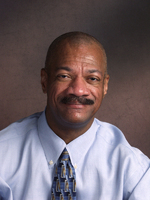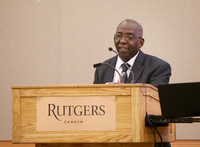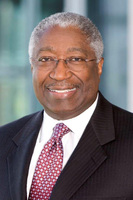Items
Array is exactly
Rutgers University-Camden
-
Black Camden Oral History ProjectThe Black Camden Oral History Project aims to preserve the history of African American life and activism in Camden, New Jersey. This is a new project led by Kendra Boyd, Assistant Professor of History at Rutgers–Camden, and Jesse Bayker, Digital Archivist at the Scarlet and Black Research Center. Several interviews have been added to Black Voices at Rutgers as a preview. Interviews conducted in 2022 in 2023 are currently being transcribed and will be added to the website in the coming months. We are currently recruiting participants for oral history interviews, and we invite African American residents of Camden and alumni of Rutgers–Camden to contact us so we can record your story. Please visit the project website at blackcamden.org for more information.
-
 Interview: Byrd, Arnold Norris, 2022 This interview was recorded as part of the Black Camden Oral History Project. Arnold Norris Byrd was born to Laura Bertha and Ralph Herman Byrd in Camden, New Jersey, in 1939. Byrd attended Rutgers University in New Brunswick from 1957 to 1961 and earned his Bachelor’s in Psychology while participating in athletics. At Rutgers he was part of the Black Student Union and the ROTC. In 1976, he graduated from Antioch College with a Master’s in Community Education. During the interview, Byrd discusses his family’s decision to move from Virginia as part of the Great Migration and his positive experiences growing up in Camden. He touches on the issue of school integration in the city. The interview includes information about his experiences in the ROTC and his military service in Korea. He ended his service as a captain in the reserves. He describes race relations in the military. He talks about his life-long participation in athletics, especially during his time at Rutgers University and while serving in the military. Byrd returned to Camden and spent most of his life residing in his hometown. The interview highlights his civil service and economic development work in the city, including work for the Welfare Board and his decades as the Executive Director of the Camden County Council on Economic Opportunity (OEO). He describes his relationship with Camden leader Poppy Sharp and the Black People’s Unity Movement. He also discusses his perspectives on Martin Luther King Jr. and Malcom X.
Interview: Byrd, Arnold Norris, 2022 This interview was recorded as part of the Black Camden Oral History Project. Arnold Norris Byrd was born to Laura Bertha and Ralph Herman Byrd in Camden, New Jersey, in 1939. Byrd attended Rutgers University in New Brunswick from 1957 to 1961 and earned his Bachelor’s in Psychology while participating in athletics. At Rutgers he was part of the Black Student Union and the ROTC. In 1976, he graduated from Antioch College with a Master’s in Community Education. During the interview, Byrd discusses his family’s decision to move from Virginia as part of the Great Migration and his positive experiences growing up in Camden. He touches on the issue of school integration in the city. The interview includes information about his experiences in the ROTC and his military service in Korea. He ended his service as a captain in the reserves. He describes race relations in the military. He talks about his life-long participation in athletics, especially during his time at Rutgers University and while serving in the military. Byrd returned to Camden and spent most of his life residing in his hometown. The interview highlights his civil service and economic development work in the city, including work for the Welfare Board and his decades as the Executive Director of the Camden County Council on Economic Opportunity (OEO). He describes his relationship with Camden leader Poppy Sharp and the Black People’s Unity Movement. He also discusses his perspectives on Martin Luther King Jr. and Malcom X. -
 Interview: Glasker, Wayne, 2022 This interview was recorded as part of the Black Camden Oral History Project. Dr. Wayne Glasker is Emeritus Professor of History at Rutgers University–Camden. He is the author of the book Black Students in the Ivory Tower: African American Student Activism at the University of Pennsylvania, 1967-1990. He was born in 1957 in Philadelphia, Pennsylvania, to Mary Johnson and Morris Glasker. His parents were part of the Great Migration and had moved from Virginia to Pennsylvania in search of better work opportunities. In these interviews, Glasker discusses his childhood in Philadelphia and his experiences at the University of Pennsylvania from 1974 to 1994. Glasker earned his Bachelor’s degree in History and Sociology in 1980. He attended graduate school at UPenn as well, earning a PhD in History in 1994. During this time, he was active in the Black Student Union on campus, student government, and in the anti-apartheid movement. He discusses his experiences as a student activist and student government leader as well as the challenges on campus for African American students. In 1990 Glasker began teaching African American history at Rutgers–Camden. He served as director of the Africana Studies program from 1998 to 2011. He describes race relations on campus in the 1990s and student activism at Rutgers. He emphasizes the list of demands from Black student activists following the occupation of the Campus Center at Rutgers–Camden in 1969. He also describes his efforts to increase civic engagement in his classes.
Interview: Glasker, Wayne, 2022 This interview was recorded as part of the Black Camden Oral History Project. Dr. Wayne Glasker is Emeritus Professor of History at Rutgers University–Camden. He is the author of the book Black Students in the Ivory Tower: African American Student Activism at the University of Pennsylvania, 1967-1990. He was born in 1957 in Philadelphia, Pennsylvania, to Mary Johnson and Morris Glasker. His parents were part of the Great Migration and had moved from Virginia to Pennsylvania in search of better work opportunities. In these interviews, Glasker discusses his childhood in Philadelphia and his experiences at the University of Pennsylvania from 1974 to 1994. Glasker earned his Bachelor’s degree in History and Sociology in 1980. He attended graduate school at UPenn as well, earning a PhD in History in 1994. During this time, he was active in the Black Student Union on campus, student government, and in the anti-apartheid movement. He discusses his experiences as a student activist and student government leader as well as the challenges on campus for African American students. In 1990 Glasker began teaching African American history at Rutgers–Camden. He served as director of the Africana Studies program from 1998 to 2011. He describes race relations on campus in the 1990s and student activism at Rutgers. He emphasizes the list of demands from Black student activists following the occupation of the Campus Center at Rutgers–Camden in 1969. He also describes his efforts to increase civic engagement in his classes. -
 Interview: Jones, Roy L., 2021 Roy L. Jones was born in Fort Lauderdale, Florida in 1946. He spent his early years in segregated Fort Lauderdale. In 1957-'58, he moved to Atlantic City, along with his mother and four brothers, following an aunt who had moved there in the 1940s. He shares his experiences growing up in the Black community in Atlantic City. After attending two HBCUs, he went to University College at Rutgers-Camden and then enrolled in the Rutgers Camden College of Arts and Sciences (CCAS), graduating in 1970. At CCAS, he was active in the Black Student Unity Movement (BSUM). In the interview, he discusses the demands of the BSUM for greater inclusivity and diversity at the University and the takeover of the College Center on February 26-27, 1969. He helped found the Black Cooperative Association, or Black Co-op, in Camden, which provided food, housing, childcare, healthcare and engagement in the arts. He was also a part of the Cooper-Grant Neighborhood Association, which opposed gentrification in Camden. In the second interview, Jones discusses his experiences as an EOF administrator at Rutgers-Camden and his involvement in the Black student protest movement. He also shares remembrances of the Camden uprisings. His work in environmental justice began in 1971 with opposition to building an incinerator in Camden and has continued through involvement in organizations such as the South Jersey Environmental Justice Alliance and the National Institute for Healthy Human Spaces. He delves into his work in addressing water safety issues in Camden and in the city's public schools. He became a Senior Environmental Fellow in 2008 and has authored several publications, including Toxic Schools in New Jersey. This interview was recorded as part of the Black Camden Oral History Project.
Interview: Jones, Roy L., 2021 Roy L. Jones was born in Fort Lauderdale, Florida in 1946. He spent his early years in segregated Fort Lauderdale. In 1957-'58, he moved to Atlantic City, along with his mother and four brothers, following an aunt who had moved there in the 1940s. He shares his experiences growing up in the Black community in Atlantic City. After attending two HBCUs, he went to University College at Rutgers-Camden and then enrolled in the Rutgers Camden College of Arts and Sciences (CCAS), graduating in 1970. At CCAS, he was active in the Black Student Unity Movement (BSUM). In the interview, he discusses the demands of the BSUM for greater inclusivity and diversity at the University and the takeover of the College Center on February 26-27, 1969. He helped found the Black Cooperative Association, or Black Co-op, in Camden, which provided food, housing, childcare, healthcare and engagement in the arts. He was also a part of the Cooper-Grant Neighborhood Association, which opposed gentrification in Camden. In the second interview, Jones discusses his experiences as an EOF administrator at Rutgers-Camden and his involvement in the Black student protest movement. He also shares remembrances of the Camden uprisings. His work in environmental justice began in 1971 with opposition to building an incinerator in Camden and has continued through involvement in organizations such as the South Jersey Environmental Justice Alliance and the National Institute for Healthy Human Spaces. He delves into his work in addressing water safety issues in Camden and in the city's public schools. He became a Senior Environmental Fellow in 2008 and has authored several publications, including Toxic Schools in New Jersey. This interview was recorded as part of the Black Camden Oral History Project. -
 Interview: Martin, Joshua W. III, 2022 This interview was recorded as part of the Black Camden Oral History Project. Joshua W. Martin III was born to Bernice B. and Joshua W. Martin in Columbia, South Carolina, in 1944. In this interview, Martin describes his childhood in Columbia, his formative experience working at his father’s barbershop, and his fascination with science. He discusses his decision to go to Case Institute of Technology in Cleveland, Ohio, and his experiences there from 1962 to 1966. Following his graduation, he began working for DuPont Company working in science and technology. He discusses his experiences as the first Black employee at the professional level at his facility and his projects there, including developing a patent for DuPont. During this period, he took graduate courses in Materials Engineering at Drexel University between 1968 and 1971. He left DuPont and Drexel and began attending Rutgers Law School in Camden in 1971. He discusses his time at the law school, particularly his work with the local organization Black People’s Unity Movement (BPUM) and his participation in their economic development work, including helping to start a Burger King near the Rutgers campus in Camden. He also talks about his relationship with the community leaders in the BPUM. After his graduation in 1974, Martin went to work for Hercules Incorporated as a patent attorney. He also served on the Board of the Better Business Bureau and the Delaware Public Service Commission. In 1982, Martin became a Superior Court judge for the State of Delaware, and he shares some of his experiences and perspectives on the justice system in the interview. Following seven years of service as a judge, Martin became General Counsel for Bell Atlantic Delaware (later Verizon Delaware) in 1990 and was made President and CEO in 1996. He ended his time with Verizon in 2005, after which he joined the law firm Potter Anderson & Corroon. Additionally, he discusses his work overseeing the delivery of health care and mental health services in several Delaware Department of Correction facilities between 2006 and 2010.
Interview: Martin, Joshua W. III, 2022 This interview was recorded as part of the Black Camden Oral History Project. Joshua W. Martin III was born to Bernice B. and Joshua W. Martin in Columbia, South Carolina, in 1944. In this interview, Martin describes his childhood in Columbia, his formative experience working at his father’s barbershop, and his fascination with science. He discusses his decision to go to Case Institute of Technology in Cleveland, Ohio, and his experiences there from 1962 to 1966. Following his graduation, he began working for DuPont Company working in science and technology. He discusses his experiences as the first Black employee at the professional level at his facility and his projects there, including developing a patent for DuPont. During this period, he took graduate courses in Materials Engineering at Drexel University between 1968 and 1971. He left DuPont and Drexel and began attending Rutgers Law School in Camden in 1971. He discusses his time at the law school, particularly his work with the local organization Black People’s Unity Movement (BPUM) and his participation in their economic development work, including helping to start a Burger King near the Rutgers campus in Camden. He also talks about his relationship with the community leaders in the BPUM. After his graduation in 1974, Martin went to work for Hercules Incorporated as a patent attorney. He also served on the Board of the Better Business Bureau and the Delaware Public Service Commission. In 1982, Martin became a Superior Court judge for the State of Delaware, and he shares some of his experiences and perspectives on the justice system in the interview. Following seven years of service as a judge, Martin became General Counsel for Bell Atlantic Delaware (later Verizon Delaware) in 1990 and was made President and CEO in 1996. He ended his time with Verizon in 2005, after which he joined the law firm Potter Anderson & Corroon. Additionally, he discusses his work overseeing the delivery of health care and mental health services in several Delaware Department of Correction facilities between 2006 and 2010.
